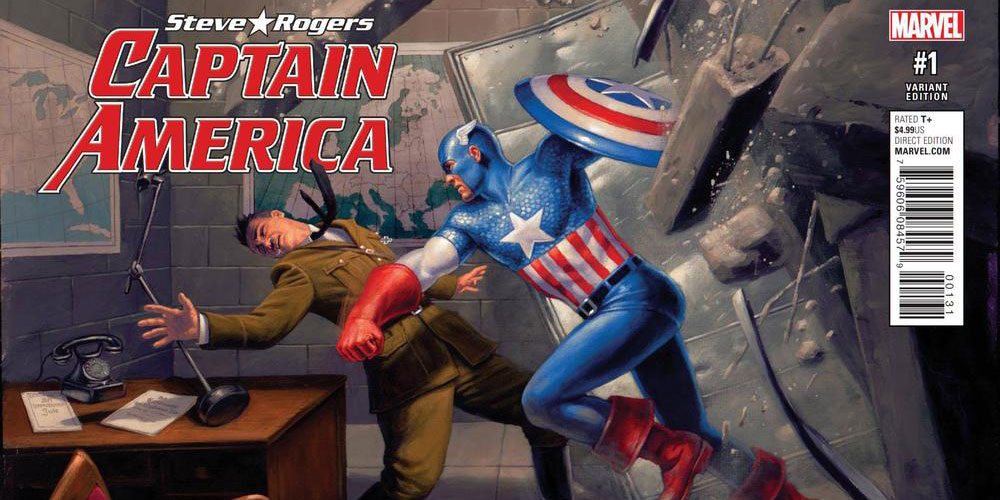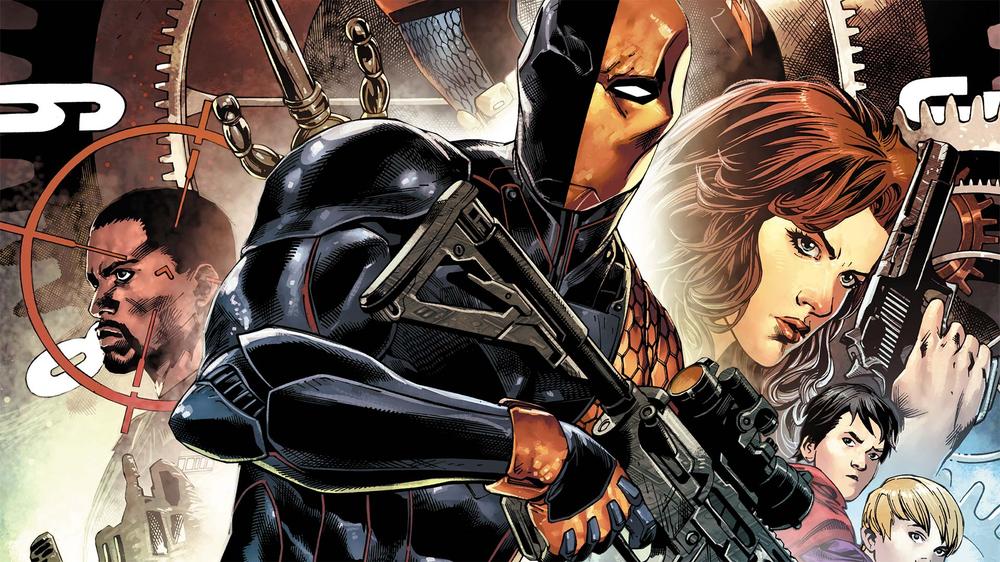Yesterday was new comic book day, and it was a spoiler-heavy one. Big moments in DC: Rebirth, Transformers, and of course Captain America. The DC spoilers went out on Monday thanks to rumor sites and had died down by the time Wednesday hit. Cap, however, created a news surge. Enough people were talking about the story that Facebook’s Trending function picked it up (spoiling the reveal in the headline – thanks, Mark!) and causing non-comic book readers to issue death threats to the writer.
What was the big reveal? I’m not a big fan of spoilers, but in case you want to know, check back after the image below.

All the way on the last page of the comic, we learn that Captain America is a Hydra agent. This is not a replacement, not a robot, but the same Steve Rogers as we have seen throughout the decades. This is very carefully established via a series of black-and-white flashbacks.
My Facebook feed is full of my fellow Jews, decrying that it is horrible that a character created by two Jews is suddenly a Nazi sleeper agent (because another thing this issue does is continue Marvel’s back-dating of Hydra’s foundation – it used to be a group made by ex-Nazis in the ’60s, now it was always part of the Reich). It’s full of people yelling that Marvel is trying to show white supremacy as cool, somehow. It’s also full of people saying “At the end of the story.”
No. Stop. Please.
Yes, it’s revealed on the last page of the comic, page 40. But while this is the last page of the comic book, it is hardly the end of the story. Comic books are largely serial fiction. Stories continue from one month to the next. Assuming a short story-arc, there are still 120 pages to go (although I suspect this will be a six-issue story, not four). This is the equivalent of reading one chapter of a book, seeing that the antagonist is one up on the heroes, and throwing it down. There is a lot more going on here.
So before you freak out, keep that in mind?
Also, for the thousands of non-comics readers reacting to this, here are some quick notes on this.
- The writer here, Nick Spenser, is far from an evil hack. He’s one of the best writers at Marvel right now. His Avengers issues are great “action movie” style comics, Superior Foes of Spider-Man is a brilliant heist comedy, and his current Ant-Man book is a unique look at a struggling, ex-con superhero that very much matches the tone of the movie. Also? His Secret Avengers comic is one of my favorites. As someone familiar with his work, I can tell you that he builds complex, layered stories. He’s not a “done in one” kind of guy.
- One of the big things about this issue is the involvement of the Red Skull. I already know one person who was turned off from this comic by the Red Skull using typical conservative talking points to recruit neo-Nazis. This, by the way, is nothing new. Marvel’s Hatemonger, Sons of the Serpent, Watchdogs, and Friends of Humanity have always used handy conservative talking points.

Evil master planner, or Trump rally? But that’s not the key bit. The key bit is that for the last few years, Marvel has been teasing the Red Skull as a big menace again. You see, they spliced his brain with that of the world’s most powerful telepath, so he is now a telepathic menace. Which leads to my next point.
- Look at the flashbacks. LOOK AT THEM.

Every flashback has this theme. Notice something? How everything is black and white except for tones of red? I wonder if that might be because the Red Skull is implanting memories in Steve? I am so confident in this that I am willing to put money on it. Not a lot; I’m broke. Let’s say $10 to charity. And if I’m right? I’ll still give to charity, but I’ll feel smug.
- Please keep in mind that comic books, as serial fiction, are about the illusion of change. None of the decried changes ever stick. Remember when the world was going to end because Doctor Octopus was now Spider-Man forever? No? Despite that crud-storm, it turned out to be a really good story about what makes a hero, and it gave us back Peter Parker in a really big way. Captain America has had some pretty major changes through the years. He’s quit and taken on another identity (twice), he’s been hooked on drugs, he’s been de-powered, aged, died twice, been lost in time, has been a werewolf (don’t ask), and so on. Some of those stories were good, some of them were terrible, but at the end the writers put all the characters back in the box for someone else to play with. That’s the nature of comics. Heck, even the current longest-standing shock-value move by Marvel (Spider-Man selling his marriage to Mephisto) is starting to get push-back.
As seen in this week’s Spider-Man/Deadpool. WHY is no-one talking about this?
So really, relax. Either sit back and enjoy the work of a talented writer, or ignore it. It’s true that “no story is just a story,” but the story isn’t finished.







They’ve already said it’s not mind control, and if they’re going to try to split hairs and claim “false memories aren’t a form of mind control…” That’s B.S. That’s mind control, and claiming otherwise is a lie.
Yeah, they also said “Otto Octavius will be Spider-Man FOREVER” and “This is the way Tony Stark is now”. They lie. A lot.
This is quite honestly one of the best pieces you’ve written.
Great piece! You mention you’re Jewish, may I ask, as a Jew, how do you feel personally about the change? There’s lots of cries of antisemitism at the mere suggestion he might actually be Hydra/Nazi, even for an issue. Do you believe this is antisemitism even if it is a “psych!” later?
Truthfully, I think the “Anti-Semitism” angle is due to Cap’s creators being Jews and creating Cap as an anti-Nazi character.
Except Kirby himself did stories with “Nazi Cap”.
What grinded me the wrong way was the need for guys like Tom Brevoort having to come out and reinforce the concept, which tells me they don’t trust the story to make its case on its own.
eh.They basically do that with every big story. They did it with Superior Spidey, etc. It’s part of the churn.
True, but that is what raised the fandoms ire. I’ve read the comic and there is no way you can derive a certain “Steve Rogers has always been a Hydra agent/sleeper agent/ this is the real deal, no mind control etc.
I’m actually fine with how the story is beginning. I didn’t need the editorial assistance that was obviously clickbait.
This article was more for those outside the fandom or on the fringes, and I think that’s also who the clickbaitness tends to be for.
Yup. Nailed it. Honestly, the way some of these guys carry on, it’s like they’ve never read a comic before.
I saw that Tom Breevoort tweeted and commented that this was the REAL Steve, not a robot, not mind-controlled and this is the way he’s always been thing.
At first, it’s really easy to fall for it and get upset if you’ve been a big Cap fan over the years. But if you take even a moment to sit back and think about this rationally, what ELSE could Tom possibly say that wouldn’t automatically torpedo sales?
This is one of those “Death of Superman” moments and I never saw DC come right out and say “Don’t worry folks – this is only a TEMPORARY death”. If they did that, what would the purpose be of creating the storyline in the first place?
Tom almost HAS to say what he is saying. To do otherwise would be counter-productive and would actually hurt sales, wouldn’t it?
“Oh, don’t worry… even though Steve is saying ‘Hail Hydra’, he’s not REALLY a sleeper agent. But go ahead and pick up the book and see for yourself…”. If someone said that, would you even CONSIDER buying the book?
This is like getting upset at soon to be released movies because you didn’t like something in the trailer of the movie. Or, how many of you would have enjoyed it if someone from Marvel would have come out prior to the release of Civil War and said “Don’t worry folks… it just LOOKS like Rhodey is dead. He survives but loses the use of his legs. Now, enjoy your show!”? 🙂
Hey now, spoilers.
If this *ISN’T* the result of the Skull and the Cube, I don’t want to live
And what if you’re wrong? What if Cap stays evil? Are you ready to live with that?
Apart from all kinds of alternate universe and more ludicrous “technical” solutions, what if this time it’s not fake change but real change? What if Cap becomes evil like Magneto did? Maybe he has a terrible childhood secret that made him evil? Is there a precedence of a hero becoming a villain for good or vice a versa? – ha ha “villain for good” – Mal’ach Chabala maybe? 🙂
First off, Magneto didn’t “become” Evil. He was always the bad guy. It was only in the last 30 years or so that he became at ll sympathetic.
Secondly, your scenario is about as likely as Tony Stark staying dead (he’s died twice) or Thor never gettng his hammer back.
Comics are about the illusion of change.
(because another thing this issue does is continue Marvel’s back-dating of Hydra’s foundation – it used to be a group made by ex-Nazis in the ’60s, now it was always part of the Reich)
So this is like the nth reworking of HYDRA’s origins, and the most recent after Hickman reworked them as an evil secret society that had always been around?
It’s why, despite trying to be sympathetic, the criticism of Captain America being a “Nazi” hasn’t convinced me. Hydra really hasn’t changed over the years, though their origins do so Capt being an agent of Hydra can mean anything from Nazi to Falangist to member of a secret society founded by Lizard people thanks to the wonders of superhero serial fiction. Though really, it means that he’s part of an evil organization with a really ill-defined agenda, outside of taking over the world that is. Equating that real-life authoritarian ideologies and movements, even with a few clear signifiers, is a questionable exercise.
I admit, Spidey selling his marriage to Mephisto to save Aunt May actually looks worse to me than Capt being an agent of Hydra is a clearly foreshadowed mind control ploy.